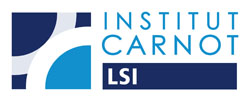 The aim of LSI is to improve the competitiveness of all actors involved in order to develop new software and intelligent systems solutions in all fields where these technologies are used, namely transportation, telecommunications, general public electronic equipment, energy distribution, medical and surgical assistance, chip cards and electronic labels. The initiator of the project is the Joseph Fourier University and its partners are Grenoble INP, INRIA and CNRS.
The aim of LSI is to improve the competitiveness of all actors involved in order to develop new software and intelligent systems solutions in all fields where these technologies are used, namely transportation, telecommunications, general public electronic equipment, energy distribution, medical and surgical assistance, chip cards and electronic labels. The initiator of the project is the Joseph Fourier University and its partners are Grenoble INP, INRIA and CNRS.
Role
To stimulate increased activities in cooperation with the companies and industries involved in the software and intelligent systems sector.
Key figures
- 11 areas of expertise
- A Consolidated budget of € 16,500 k
- Partner research profit of € 12,025 k
- Creation of 22 spin-offs since 1995
Where
ZI de Mayencin Allée de Palestine in Gières, France
When
- First approval in 2007 for four years
- Second approval in 2011
The stakeholders
- Project initiator – Joseph Fourier University
- Associated institutions – Grenoble INP, INRIA and CNRS
Technical laboratories and research platforms
A total of 510 researchers from 8 laboratories:
3 research platforms:
- GIPSa-lab, automation and signal processing
- LIG, information technology
- TIMA, chip circuit, microelectronics
- TIMC, information technology for health
- VERIMAG, embedded systems
- AGIM, information technology for dependent people
- G-Scop, sciences for design, optimisation and production
3 research platforms:
- ARIS: towards Radiation-Resistant Embedded Applications and Circuits
- Domus: Test platform for home automation
- Multicom: Experiment platform
Taking things a step further
LSI is located at the heart of the Minalogic Competitive Cluster. It is deeply committed to promoting the transfer of technology and know-how which it does through its involvement in number of industrial partnerships on a national and European level.
LSI addresses the entire software production sector ranging from modelling, design, and implantation to administration and development. However, it more specifically targets emerging applications (health, home automation, embedded systems, etc.) in order to satisfy their specific safety, interoperability, user acceptability and other needs.
It uses key technologies such as architecture of processes and systems, engineering of embedded systems, software components and service platforms, sensor networks and RFID, human-machine cooperation, instrumentation associated with life sciences, optimisation of processes and data processing.
There are four major fields of action of the many possibilities available. The teams at LSI design and develop innovative solutions for all problems related with intelligent buildings, for technical management applications for service buildings or home automation solutions for individuals. They also provide their expertise from the design of robust languages by construction to validation of systems in real conditions, in order to design more high performance, cost-effective and reliable systems. Carnot Institute LSI draws on the expertise of its cross-functional teams to design and develop medical devices of the future as well as innovative solutions for all problems related with embedded intelligence.
LSI addresses the entire software production sector ranging from modelling, design, and implantation to administration and development. However, it more specifically targets emerging applications (health, home automation, embedded systems, etc.) in order to satisfy their specific safety, interoperability, user acceptability and other needs.
It uses key technologies such as architecture of processes and systems, engineering of embedded systems, software components and service platforms, sensor networks and RFID, human-machine cooperation, instrumentation associated with life sciences, optimisation of processes and data processing.
There are four major fields of action of the many possibilities available. The teams at LSI design and develop innovative solutions for all problems related with intelligent buildings, for technical management applications for service buildings or home automation solutions for individuals. They also provide their expertise from the design of robust languages by construction to validation of systems in real conditions, in order to design more high performance, cost-effective and reliable systems. Carnot Institute LSI draws on the expertise of its cross-functional teams to design and develop medical devices of the future as well as innovative solutions for all problems related with embedded intelligence.



